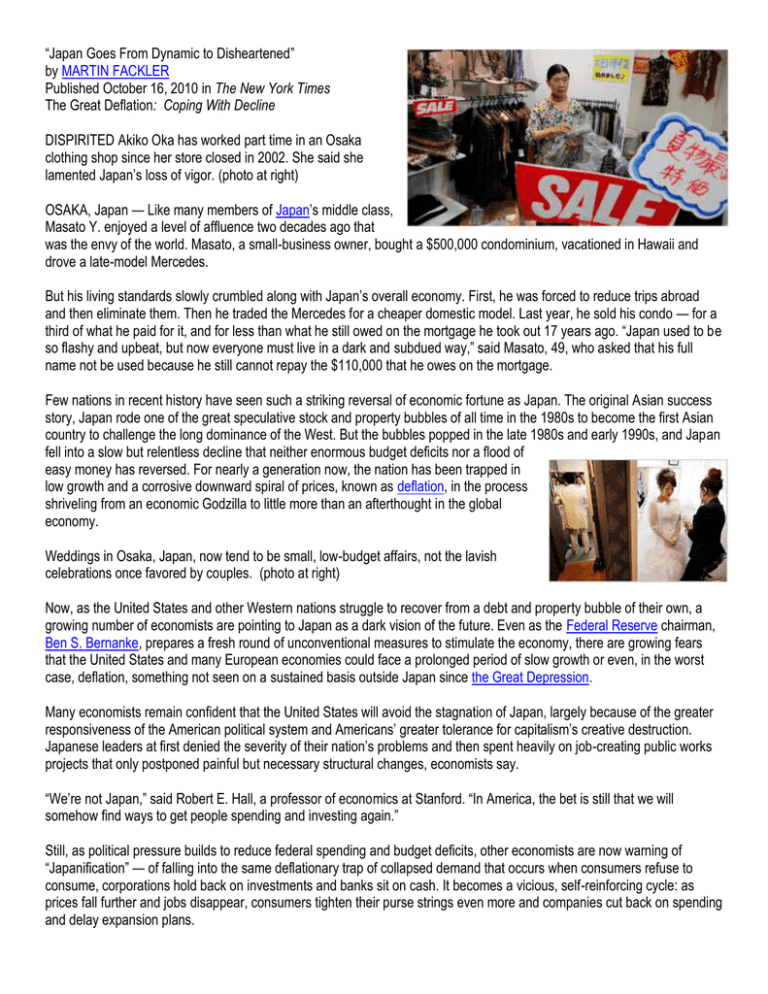“Japan Goes From Dynamic to Disheartened” y The New York Times
advertisement

“Japan Goes From Dynamic to Disheartened” by MARTIN FACKLER Published October 16, 2010 in The New York Times The Great Deflation: Coping With Decline DISPIRITED Akiko Oka has worked part time in an Osaka clothing shop since her store closed in 2002. She said she lamented Japan’s loss of vigor. (photo at right) OSAKA, Japan — Like many members of Japan’s middle class, Masato Y. enjoyed a level of affluence two decades ago that was the envy of the world. Masato, a small-business owner, bought a $500,000 condominium, vacationed in Hawaii and drove a late-model Mercedes. But his living standards slowly crumbled along with Japan’s overall economy. First, he was forced to reduce trips abroad and then eliminate them. Then he traded the Mercedes for a cheaper domestic model. Last year, he sold his condo — for a third of what he paid for it, and for less than what he still owed on the mortgage he took out 17 years ago. “Japan used to be so flashy and upbeat, but now everyone must live in a dark and subdued way,” said Masato, 49, who asked that his full name not be used because he still cannot repay the $110,000 that he owes on the mortgage. Few nations in recent history have seen such a striking reversal of economic fortune as Japan. The original Asian success story, Japan rode one of the great speculative stock and property bubbles of all time in the 1980s to become the first Asian country to challenge the long dominance of the West. But the bubbles popped in the late 1980s and early 1990s, and Japan fell into a slow but relentless decline that neither enormous budget deficits nor a flood of easy money has reversed. For nearly a generation now, the nation has been trapped in low growth and a corrosive downward spiral of prices, known as deflation, in the process shriveling from an economic Godzilla to little more than an afterthought in the global economy. Weddings in Osaka, Japan, now tend to be small, low-budget affairs, not the lavish celebrations once favored by couples. (photo at right) Now, as the United States and other Western nations struggle to recover from a debt and property bubble of their own, a growing number of economists are pointing to Japan as a dark vision of the future. Even as the Federal Reserve chairman, Ben S. Bernanke, prepares a fresh round of unconventional measures to stimulate the economy, there are growing fears that the United States and many European economies could face a prolonged period of slow growth or even, in the worst case, deflation, something not seen on a sustained basis outside Japan since the Great Depression. Many economists remain confident that the United States will avoid the stagnation of Japan, largely because of the greater responsiveness of the American political system and Americans’ greater tolerance for capitalism’s creative destruction. Japanese leaders at first denied the severity of their nation’s problems and then spent heavily on job-creating public works projects that only postponed painful but necessary structural changes, economists say. “We’re not Japan,” said Robert E. Hall, a professor of economics at Stanford. “In America, the bet is still that we will somehow find ways to get people spending and investing again.” Still, as political pressure builds to reduce federal spending and budget deficits, other economists are now warning of “Japanification” — of falling into the same deflationary trap of collapsed demand that occurs when consumers refuse to consume, corporations hold back on investments and banks sit on cash. It becomes a vicious, self-reinforcing cycle: as prices fall further and jobs disappear, consumers tighten their purse strings even more and companies cut back on spending and delay expansion plans. “The U.S., the U.K., Spain, Ireland, they all are going through what Japan went through a decade or so ago,” said Richard Koo, chief economist at Nomura Securities who recently wrote a book about Japan’s lessons for the world. “Millions of individuals and companies see their balance sheets going underwater, so they are using their cash to pay down debt instead of borrowing and spending.” Just as inflation scarred a generation of Americans, deflation has left a deep imprint on the Japanese, breeding generational tensions and a culture of pessimism, fatalism and reduced expectations. While Japan remains in many ways a prosperous society, it faces an increasingly grim situation, particularly outside the relative economic vibrancy of Tokyo, and its situation provides a possible glimpse into the future for the United States and Europe, should the most dire forecasts come to pass. Scaled-Back Ambitions The downsizing of Japan’s ambitions can be seen on the streets of Tokyo, where concrete “microhouses” have become popular among younger Japanese who cannot afford even the famously cramped housing of their parents, or lack the job security to take out a traditional multidecade loan. These matchbox-size homes stand on plots of land barely large enough to park a sport utility vehicle, yet have three stories of closet-size bedrooms, suitcase-size closets and a tiny kitchen that properly belongs on a submarine. “This is how to own a house even when you are uneasy about the future,” said Kimiyo Kondo, general manager at Zaus, a Tokyo-based company that builds microhouses. For many people under 40, it is hard to grasp just how far this is from the 1980s, when a mighty — and threatening — “Japan Inc.” seemed ready to obliterate whole American industries, from automakers to supercomputers. With the Japanese stock market quadrupling and the yen rising to unimagined heights, Japan’s companies dominated global business, gobbling up trophy properties like Hollywood movie studios (Universal Studios and Columbia Pictures), famous golf courses (Pebble Beach) and iconic real estate (Rockefeller Center). In 1991, economists were predicting that Japan would overtake the United States as the world’s largest economy by 2010. In fact, Japan’s economy remains the same size it was then: a gross domestic product of $5.7 trillion at current exchange rates. During the same period, the United States economy doubled in size to $14.7 trillion, and this year China overtook Japan to become the world’s No. 2 economy. China has so thoroughly eclipsed Japan that few American intellectuals seem to bother with Japan now, and once crowded Japanese-language classes at American universities have emptied. Even Clyde V. Prestowitz, a former Reagan administration trade negotiator whose writings in the 1980s about Japan’s threat to the United States once stirred alarm in Washington, said he was now studying Chinese. “I hardly go to Japan anymore,” Mr. Prestowitz said. The decline has been painful for the Japanese, with companies and individuals like Masato having lost the equivalent of trillions of dollars in the stock market, which is now just a quarter of its value in 1989, and in real estate, where the average price of a home is the same as it was in 1983. And the future looks even bleaker, as Japan faces the world’s largest government debt — around 200 percent of gross domestic product — a shrinking population and rising rates of poverty and suicide. But perhaps the most noticeable impact here has been Japan’s crisis of confidence. Just two decades ago, this was a vibrant nation filled with energy and ambition, proud to the point of arrogance and eager to create a new economic order in Asia based on the yen. Today, those high-flying ambitions have been shelved, replaced by weariness and fear of the future, and an almost stifling air of resignation. Japan seems to have pulled into a shell, content to accept its slow fade from the global stage. Its once voracious manufacturers now seem prepared to surrender industry after industry to hungry South Korean and Chinese rivals. Japanese consumers, who once flew by the planeload on flashy shopping trips to Manhattan and Paris, stay home more often now, saving their money for an uncertain future or setting new trends in frugality with discount brands like Uniqlo. As living standards in this still wealthy nation slowly erode, a new frugality is apparent among a generation of young Japanese, who have known nothing but economic stagnation and deflation. They refuse to buy big-ticket items like cars or televisions, and fewer choose to study abroad in America. Japan’s loss of gumption is most visible among its young men, who are widely derided as “herbivores” for lacking their elders’ willingness to toil for endless hours at the office, or even to succeed in romance, which many here blame, only half jokingly, for their country’s shrinking birthrate. “The Japanese used to be called economic animals,” said Mitsuo Ohashi, former chief executive officer of the chemicals giant Showa Denko. “But somewhere along the way, Japan lost its animal spirits.” When asked in dozens of interviews about their nation’s decline, Japanese, from policy makers and corporate chieftains to shoppers on the street, repeatedly mention this startling loss of vitality. While Japan suffers from many problems, most prominently the rapid graying of its society, it is this decline of a once wealthy and dynamic nation into a deep social and cultural rut that is perhaps Japan’s most ominous lesson for the world today. The classic explanation of the evils of deflation is that it makes individuals and businesses less willing to use money, because the rational way to act when prices are falling is to hold onto cash, which gains in value. But in Japan, nearly a generation of deflation has had a much deeper effect, subconsciously coloring how the Japanese view the world. It has bred a deep pessimism about the future and a fear of taking risks that make people instinctively reluctant to spend or invest, driving down demand — and prices — even further. “A new common sense appears, in which consumers see it as irrational or even foolish to buy or borrow,” said Kazuhisa Takemura, a professor at Waseda University in Tokyo who has studied the psychology of deflation. A Deflated City While the effects are felt across Japan’s economy, they are more apparent in regions like Osaka, the third-largest city, than in relatively prosperous Tokyo. In this proudly commercial city, merchants have gone to extremes to coax shell-shocked shoppers into spending again. But this often takes the shape of price wars that end up only feeding Japan’s deflationary spiral. There are vending machines that sell canned drinks for 10 yen, or 12 cents; restaurants with 50-yen beer; apartments with the first month’s rent of just 100 yen, about $1.22. Even marriage ceremonies are on sale, with discount wedding halls offering weddings for $600 — less than a tenth of what ceremonies typically cost here just a decade ago. On Senbayashi, an Osaka shopping street, merchants recently held a 100-yen day, offering much of their merchandise for that price. Even then, they said, the results were disappointing. “It’s like Japanese have even lost the desire to look good,” said Akiko Oka, 63, who works part time in a small apparel shop, a job she has held since her own clothing store went bankrupt in 2002. This loss of vigor is sometimes felt in unusual places. Kitashinchi is Osaka’s premier entertainment district, a threecenturies-old playground where the night is filled with neon signs and hostesses in tight dresses, where just taking a seat at a top club can cost $500. But in the past 15 years, the number of fashionable clubs and lounges has shrunk to 480 from 1,200, replaced by discount bars and chain restaurants. Bartenders say the clientele these days is too cost-conscious to show the studied disregard for money that was long considered the height of refinement. “A special culture might be vanishing,” said Takao Oda, who mixes perfectly crafted cocktails behind the glittering gold countertop at his Bar Oda. After years of complacency, Japan appears to be waking up to its problems, as seen last year when disgruntled voters ended the virtual postwar monopoly on power of the Liberal Democratic Party. However, for many Japanese, it may be too late. Japan has already created an entire generation of young people who say they have given up on believing that they can ever enjoy the job stability or rising living standards that were once considered a birthright here. Yukari Higaki, 24, said the only economic conditions she had ever known were ones in which prices and salaries seemed to be in permanent decline. She saves as much money as she can by buying her clothes at discount stores, making her own lunches and forgoing travel abroad. She said that while her generation still lived comfortably, she and her peers were always in a defensive crouch, ready for the worst. “We are the survival generation,” said Ms. Higaki, who works part time at a furniture store. Hisakazu Matsuda, president of Japan Consumer Marketing Research Institute, who has written several books on Japanese consumers, has a different name for Japanese in their 20s; he calls them the consumption-haters. He estimates that by the time this generation hits their 60s, their habits of frugality will have cost the Japanese economy $420 billion in lost consumption. “There is no other generation like this in the world,” Mr. Matsuda said. “These guys think it’s stupid to spend.” Deflation has also affected businesspeople by forcing them to invent new ways to survive in an economy where prices and profits only go down, not up. Yoshinori Kaiami was a real estate agent in Osaka, where, like the rest of Japan, land prices have been falling for most of the past 19 years. Mr. Kaiami said business was tough. There were few buyers in a market that was virtually guaranteed to produce losses, and few sellers, because most homeowners were saddled with loans that were worth more than their homes. Some years ago, he came up with an idea to break the gridlock. He created a company that guides homeowners through an elaborate legal subterfuge in which they erase the original loan by declaring personal bankruptcy, but continue to live in their home by “selling” it to a relative, who takes out a smaller loan to pay its greatly reduced price. “If we only had inflation again, this sort of business would not be necessary,” said Mr. Kaiami, referring to the rising prices that are the opposite of deflation. “I feel like I’ve been waiting for 20 years for inflation to come back.” One of his customers was Masato, the small-business owner, who sold his four-bedroom condo to a relative for about $185,000, 15 years after buying it for a bit more than $500,000. He said he was still deliberating about whether to expunge the $110,000 he still owed his bank by declaring personal bankruptcy. Economists said one reason deflation became self-perpetuating was that it pushed companies and people like Masato to survive by cutting costs and selling what they already owned, instead of buying new goods or investing. “Deflation destroys the risk-taking that capitalist economies need in order to grow,” said Shumpei Takemori, an economist at Keio University in Tokyo. “Creative destruction is replaced with what is just destructive destruction.” Steve Lohr contributed reporting from New York. All photographs by Hiro Komae for The New York Times. A version of this article appeared in print on October 17, 2010, on page A1 of the New York edition.



